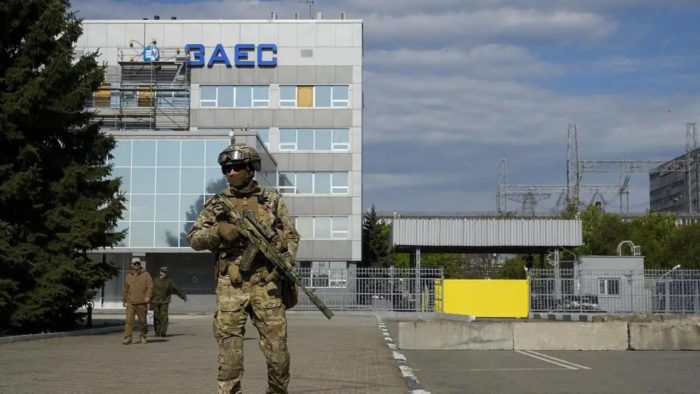The General Conference of the International Atomic Energy Agency (IAEA) has adopted a resolution titled “Nuclear Safety, Physical Protection, and Safeguards in Ukraine,” which calls on Russia to immediately deoccupy the Zaporizhzhia Nuclear Power Plant (ZNPP). Moscow, however, has no intention of doing so.
In September 2025, the IAEA stated that Russian forces had violated nearly all principles of nuclear safety at the occupied ZNPP. Despite this, Russia refuses to relinquish control. Petro Andriushchenko, head of the Center for Occupation Studies, said Russia plans to use the seized plant to supply electricity to its secret military facility at Azovstal in Mariupol.
The ZNPP has been under occupation since 4 March 2022. Since then, the IAEA has repeatedly passed resolutions calling for the plant’s return to Ukrainian control, none of which have been implemented.
Earlier, UN Secretary-General António Guterres called for the creation of a “demilitarized zone” around the ZNPP at the UN Security Council. But Russia’s permanent representative to the UN, Vasily Nebenzya, immediately dismissed the proposal, Deutsche Welle writes.
Effectively, the only solution is to deoccupy Zaporizhzhia Oblast to protect European countries from the destruction of the largest station in Europe.
A direct call for deoccupation
“The resolution contains a direct call for the immediate removal of all unauthorized military and other personnel from the ZNPP,” states the Ukrainian Energy Ministry.
The document confirms that the Zaporizhzhia Nuclear Power Plant and all nuclear facilities in Ukraine must operate under the full sovereign control of competent Ukrainian authorities.
The resolution also reaffirmed the mandate and ongoing work of the IAEA mission at ZNPP despite Russia’s repeated attempts to undermine its activities.
Additionally, the document highlighted Russian strikes on the Chornobyl Exclusion Zone and damage to the New Safe Confinement, emphasizing the risks these actions pose to international nuclear safety.
The ZNPP case illustrates how limited the enforcement of international law can be in real-world situations.
Ukraine’s response and pressure
“We are grateful to every country that supported this crucial document. Sixty-two votes in favor demonstrate the civilized world’s clear stance: nuclear terrorism is unacceptable, and the ZNPP, occupied by Russia, must be immediately returned to Ukrainian control,” claims the agency.
Ukraine’s Energy Minister Svitlana Hrynchuk says Ukraine will continue to work with the IAEA and partners to ensure the implementation of every provision of this resolution.
Ukraine stresses that the increased international pressure on Russia is necessary to ensure full and unconditional compliance with all IAEA resolutions and the return of the Zaporizhzhia NPP under Ukrainian control.
Legal violations of the ZNPP occupation
- UN Charter: The occupation and military maneuvers around ZNPP endanger nuclear safety, violate the principles of peaceful coexistence, and threaten regional stability.
- Hague and Geneva Conventions (First Additional Protocol, 1977, Article 56): Attacks on objects that could cause major technological disasters, such as nuclear power plants, are prohibited. Even if such objects are considered military targets, attacks are forbidden if there is a risk of severe civilian casualties.
- International treaties on the peaceful use of nuclear energy and IAEA resolutions.




